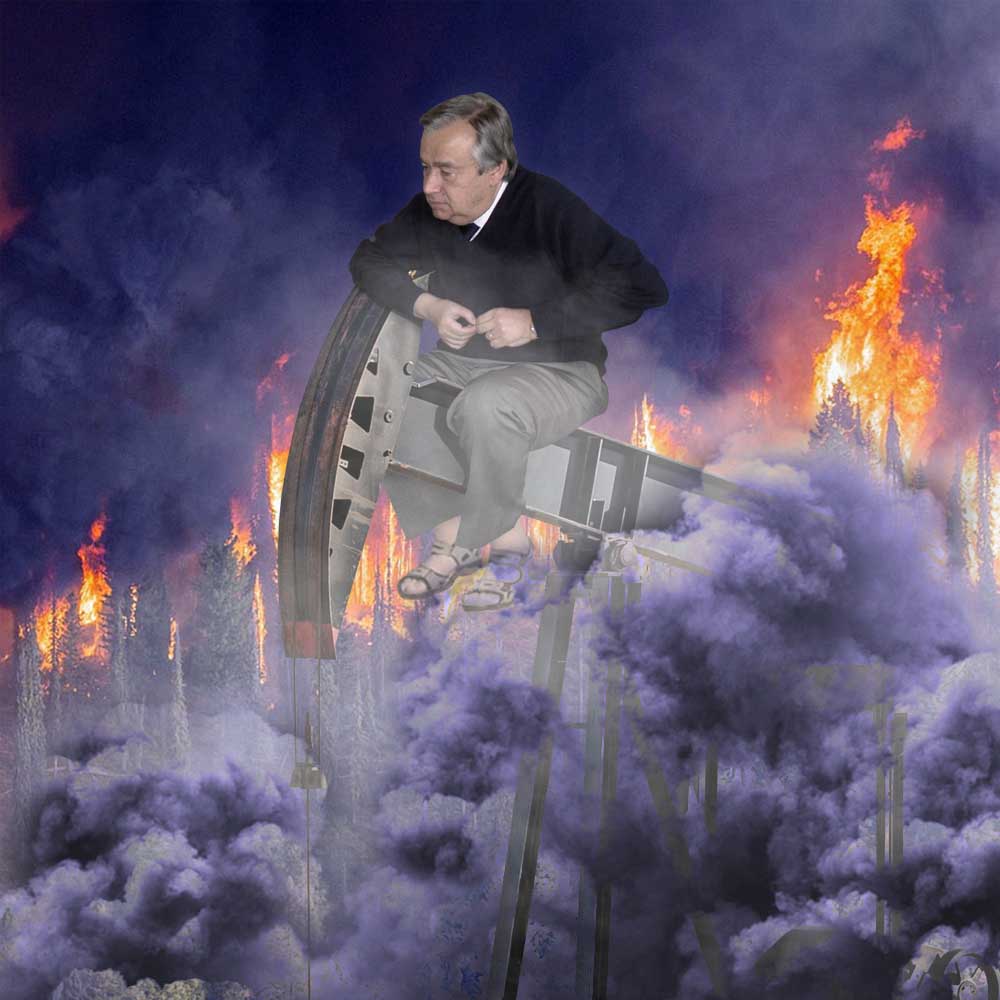UN is OK with sacrificing half the world to safeguard profits~ 6 min

By Nguyen
Since Monday the 23rd of September, 2019, people have been furiously mashing their keyboards to write about the UN climate summit. Little has been said about what was actually decided. This means that we can expect to continue increasing the amount of carbon dioxide and other greenhouse gases (ghg) that we pump into the atmosphere until 2050. The Paris agreement must be respected and we will keep global warming below 1.5ºC.
For those that haven’t been paying attention, this is absurd, ridiculous and outright criminal. It condemns a large part of the world’s population to death and extreme poverty, while another part sees the places were they live disappear and the risk of starvation and lack of drinking water increase world wide. But, since most victims are and will continue to be (at least in the short, medium term) non-white, then everything is alright.
Let’s start with the argument that is hardest to untangle. Keeping global warming below 1.5ºC by 2050. The UN acknowledges that some tipping points have already passed us by, causing more instability and climate catastrophes. In 2018 the IPCC (Intergovernmental Panel on Climate Change) published a study stating that it was crucial for various nations to have radical policies in place by 2020, if we wanted to reduce climate change. Nothing remotely similar is in place.
The report was criticized for being over-conservative in its conclusions, as the data presented actually suggests another scenario. It shows that the Paris agreement policies simply aren’t sufficient to keep global warming below 1.5ºC. It shows that CO2 emissions need to decrease by 45% by 2030 in order to keep global warming below 1.5ºC. Allowing emissions to continue at their present rate or increasing them will lead to a 3 to 4ºC global warming.
In realistic terms, the Paris agreement was little more than signed wet paper. This new agreement shares the main problem of COP21. Which is, if nobody keeps to their pledges, all the other signatories can do is complain about it on TV.
As such, climate changes has become more intense and a far serious problem. Nonetheless, here are some of the major victories won by these amazing treaties.
A list of triumphs
July 2019 was the warmest month ever recorded. The period between 2014 and 2018 saw the 5 warmest years ever recorded. Of the top 10 warmest years ever, 1998 is the only year that doesn’t belong to the XXI century.
Regarding carbon dioxide and other greenhouse gas emissions, we should bear in mind that these are accumulating in the atmosphere. These are the gases that are causing global warming and climate change. In 2017, carbon dioxide emissions increased 1.6% worldwide and in 2018 they increased 2.7%. Please note that carbon dioxide and other greenhouse gases remain in the atmosphere for periods that vary from several years, to thousands of years. Since 2007, methane emissions have increased, and speeding up from 2014 onwards. Methane is 30 times more powerful as a greenhouse gas than carbon dioxide.
Climate change and its initial effects can already be felt. In July, a heatwave hit Europe, killing 1435 people in France. In Portugal, in October, we are facing a new drought scenario. There are no exact figures on casualties of the Indian heatwave, but the New York Times counts at least 36 dead. The encephalitis epidemic that was caused or aggravated by the heatwave led to the death of at least 100 children. There were also many injuries caused by several fights that broke out between people waiting to get water in government created distribution centers.
Also in India, floods caused by extreme monsoon rains killed over 1000 people and displaced 1.2 million people. Floods in Spain killed 6 people and left over 440 homeless. Another flood that started in Bangladesh left 200 thousand people homeless in that same country, and caused the death of 97 people in India and 67 in Nepal.
Tuvalu, a country in the Pacific is risking disappearance due to an increase in the average water level. The same fate is faced by the Marshall Islands and other Pacific nations. In Peru, torrential rains killed 39 and affected 8299 people, destroying roads, bridges and schools. In Bolivia, 31 people died and 23 000 families were affected by rains and floods. In South Africa, the same phenomenon killed 70 people and left over 1000 homeless.
Hurricane Dorian killed 53 people in the Bahamas. 70 000 became homeless. The Bahamas has a population of 391 thousand people, which means that 17% of the population became homeless in just a few days. Mozambique was hit by 2 cyclones in the same year, a first in their history. Cyclones Kenneth and Idai, killed 600 people and affected over 160 000. In southeast Asia, pollution clouds affect vast areas and countries every year; in Indonesia the sky turned red. In Mexico, hurricane Michael killed 35 people. In Puerto Rico, 2975 were killed by hurricane Maria.
Wildfires and droughts are spreading throughout the world, endangering millions of people. Jordan, Somalia and Pakistan face severe droughts, which have been ongoing for years. Huge forest fires swept through Brazil, Indonesia and the sub-saharan region. California, in the USA, also faced large forest fires. Colder regions were also unusually affected by wildfires, such as Siberia (in Russia), Alasca (in the USA) and Alberta (in Canada).
In Greenland, ice is melting at a much faster rate than expected, and is currently already at the level predicted for 2070. In the Arctic, the ice shelf is decreasing continuously. The same thing is happening in Antarctica. Please note that the 2018 IPCC report was considered too conservative in its conclusions and didn’t take into account the 2019 ice melt data. The 2019 pre-report states that the situation is deteriorating faster than expected. So, if in 2018 the report was too shy in pointing out the urgency of the situation, now in 2019 we can say that is not realistic, as the current situation is more serious and urgent than predicted.
But fear not. The UN, Western nations and capitalists are perfectly willing to sacrifice all these lives and more up until 2050. António Guterres clearly desires even more capitalism, more money, funds and private companies involved with the “solution”, but with an eco oriented marketing campaign.
The capitalist mode of production will create thousands more (if not millions more) dead and homeless, but we can’t say negative things about it. On the other hand, we will have an extra 30 years to watch our lives being torn apart, houses flooded, roads and transports destroyed and who knows what the future will hold for today’s children and youth. If we want to minimize the effects of climate change and guarantee the sustainability of our lives, it is urgent to change the system. There are no solutions inside capitalism, only beyond it.




